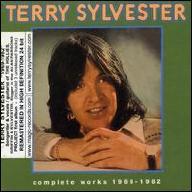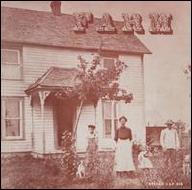Terry Sylvester was born in Liverpool and grew up in the Allerton section, only a few hundred yards from his older contemporary, Paul McCartney. Sylvester's father, James Sylvester, was a jazz trombonist in his spare time, who had played in big bands, and he introduced the boy to music at a very early age. With his father's encouragement, Sylvester gravitated toward music, beginning with Dean Martin -- whose Volare was the first record he ever bought -- and then moving on to Elvis Presley's Hound Dog b/w Don't Be Cruel. It was the Everly Brothers, Sylvester revealed in an interview with Jud Cost in 1997, who pulled him completely into rock roll, however, with their harmony singing and crisp guitar parts. By the early '60s, he had co-founded his first group, the Escorts, with schoolmates Mike Gregory and John Kinrade. The Escorts, starting out later than such rivals as the Big Three or the Beatles, worked in their shadow to some degree, although they did end up on the same bill with the Beatles at the Cavern Club on many occasions between 1961 and 1963, and were there when the Beatles played their last show there.
The McCartney and Sylvester families knew each other (as did the Sylvester and Harrison families, to a lesser degree), and Terry Sylvester, in a younger, newer group, looked at Paul McCartney and the other Beatles first as a more experienced group with which they had a friendly rivalry, and later as true heroes for having achieved superstardom with the sound they'd created in Liverpool. The Escorts, whose sound was based on the harmony singing of the Everly Brothers but with a harder rock roll beat -- not too far removed from what the Beatles and the Hollies were about -- always seemed poised to break out of Liverpool and the surrounding area, but never quite made it. They worked regularly and steadily, usually six nights a week according to Sylvester, but never ascended to the front rank of Merseybeat groups. They were good enough to get signed to Fontana Records in 1964, and they released five singles for the label over the next two years before jumping to EMI-Columbia for two final releases in 1966.
Their version of Dizzy Miss Lizzy predated that of the Beatles, and they cut a single of Bert Berns and Jerry Wexler's I Don't Want to Go on Without You that was quite good, only to see the RB-era Moody Blues get the lion's share of sales with their version. The group did break out of Liverpool, but only on a limited basis beyond the surrounding area and some gigs in Germany; significantly, the Escorts were booked with the Hollies at the same club in Munich, Germany, when three of the bandmembers fell ill, and Graham Nash, Allan Clarke, and Bobby Elliott of the Hollies played the gig in place of the stricken Escorts members, thus sharing a stage with Sylvester four years before he joined their group. He was, by his own account, friendly with Nash and Clarke on a social level as well.
By the time of the Escorts' final single, From Head to Toe, Paul McCartney had taken an interest in their fate, playing tambourine on the record, but the group's days were numbered. The chance came in 1966 for Sylvester (along with Mike Gregory) to leave the Escorts and join the Swinging Blue Jeans, who needed two new members and were under the same management. The Swinging Blue Jeans were a much more successful Liverpool outfit who, although past their biggest years, had enjoyed a pair of major international hits in Hippy Hippy Shake and Good Golly Miss Molly, and were still getting good gigs at home and overseas, where the Escorts had to work harder to make a living.
He spent three years with the group. Meanwhile, fate and Graham Nash's growing interest in moving to America and working with Stephen Stills and David Crosby took a hand -- he quit the Hollies late in 1968, and Terry Sylvester was the person the group thought of as a replacement. He joined amid some speculation in the British music press that the group couldn't continue without Nash, and proved it all wrong -- the first single by the new Hollies lineup, Sorry Suzanne, was a number three hit in England, thus launching the second major phase in the group's history with a commercial bang. He next attended a session where the group dubbed on the harmony vocals and final instrumental parts to the songs for Hollies Sing Dylan, which had been layed down on their basic form late in 1968 without Nash. That album, although controversial, served to introduce Sylvester formally to the fans, and while many Dylan purists may have argued about the arrangements and orchestral accompaniments on some of the tracks, no one could say anything against the quality of Sylvester's harmony singing, which was extraordinary, possibly even more polished than Nash's.
Sylvester was introduced as a songwriter on Hollies Sing Hollies (issued in America as He Ain't Heavy, He's My Brother, on which all of the group's originals were eclipsed by the international hit title track); he acquitted himself well, in collaboration with Allan Clarke and Tony Hicks and also just with Clarke. On subsequent records, the Hollies' composing efforts went in separate directions, and Sylvester contributed solo compositions as well as joint works with Clarke.
Sylvester played more guitar on the Hollies' records than Graham Nash did, and was a major contributor to their stage sound during the biggest and most extensive tours of their history. Until Sylvester joined the group, Tony Hicks played virtually all of the guitars on-stage, but that changed as the band's sets got longer and more ambitious; Sylvester was more of an equal partner on the instrumental side of the band than his predecessor had been. He seldom escaped being mentioned in Nash's shadow, especially in America, where Crosby, Stills, Nash, Young were hugely popular and the Hollies were somewhat less than imposing as a presence, despite a string of hits that ran into the early '70s.
In 1974, Sylvester cut his first solo album, a self-titled work that was released by Epic Records in America. A second album, I Believe, cut with Alan Parsons co-producing with Ron Richards, the Hollies' longtime producer, followed in 1976. He also contributed vocals to the Alan Parson Project's Tales of Mystery and Imagination album in 1975. These activities were overshadowed by the Hollies' touring and their mid-'70s chart success with songs like The Air That I Breathe; Sylvester's harmony singing was considered essential to their sound by then, and he was as important a member as Nash had ever been. He also became very prolific as a songwriter as the decade went on, although, as with most of the group's originals (apart from the Tony Hicks co-authored Long Dark Road) of the '70s, Sylvester's original songs never loomed large in the group's popular repertory.
Sylvester split with the Hollies in May of 1981, in an incident that precipitated the resignation of longtime bassist Bernie Calvert. That same year, he recorded Griffin Sylvester in collaboration with ex-Bread member James Griffin in Memphis. Although not as visible as he was in his former group, Sylvester has remained active in music -- he and Griffin have concertized together in America, while Sylvester's British performances have usually been solo. Needless to say, many Hollies and Swinging Blue Jeans songs appear in his repertory. ~ Bruce Eder, Rovi














